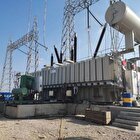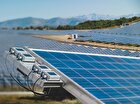Iranian Scientists Provide System for Simultaneous Production of Water, Electricity with Zero Carbon Remnants

In an interview with Iranian media, Amir Hossein Hosseinpour, the chief executive of the project to produce water desalination system said that the project was a comprehensive project results of which can lead the country towards sustainable development.
“There is an urgent need for water and preserving the water resources, as well as the need for electricity for industries and other uses,” Hosseinpour said.
“Accordingly, in this research project, we followed an idea whose implementation will bring the carbon traces to zero. In our project we used carved mirrors to concentrate sunlight on a source contaminated with salt. We found that in this way the existing salt starts to dissolve and after that the sea water enters this cycle, due to the high temperature of the salt, the water that flows in will vaporize,” he explained about the system’s operation.
“The generated steam is directed into the turbines. Then electricity is generated when the turbine starts to operate. Next, this steam enters the distillation machine, and with the condensation process, water that can be used in industries and agriculture will be produced," he went on to say.
The executive director of the project stated that their system is a type of water desalination systems, while stressing that in most of the water desalination machines, the produced waste flows into the sea water which causes the sea water to lose its natural balance and increase its salinity. An increase in water salinity will increase the temperature of water environments. While in this system, the effluent will not flow into the sea; Rather, these solvents are used to make lithium batteries.
“Currently, heavy metals such as cobalt and nickel are used to produce lithium batteries, which are harmful to the environment; But in our system, the solutes in the salt are used to make lithium batteries,” the IAU researcher further said
Stressing that the world is moving towards replacing clean energy with fossil fuels, Hosseinpour pointed out that the world urgently needs electric energy and lithium batteries. This system can be developed in that direction.
Emphasizing that the system is capable of producing water and electricity simultaneously, Hosseinpour said, “Our system has multiple applications contrary to their systems that have one single application.”
4155/i





















